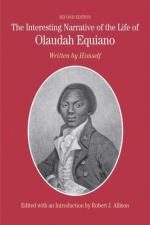The small account in which the life of a negro is held in the West Indies is so universally known, that it might seem impertinent to quote the following extract, if some people had not been hardy enough of late to assert that negroes are on the same footing in that respect as Europeans. By the 329th Act, page 125, of the Assembly of Barbadoes, it is enacted ’That if any negro, or other slave, under punishment by his master, or his order, for running away, or any other crime or misdemeanor towards his said master, unfortunately shall suffer in life or member, no person whatsoever shall be liable to a fine; but if any man shall out of wantonness, or only of bloody-mindedness, or cruel intention, wilfully kill a negro, or other slave, of his own, he shall pay into the public treasury fifteen pounds sterling.’ And it is the same in most, if not all, of the West India islands. Is not this one of the many acts of the islands which call loudly for redress? And do not the assembly which enacted it deserve the appellation of savages and brutes rather than of Christians and men? It is an act at once unmerciful, unjust, and unwise; which for cruelty would disgrace an assembly of those who are called barbarians; and for its injustice and insanity would shock the morality and common sense of a Samaide or a Hottentot.
Shocking as this and many more acts of the bloody West India code at first view appear, how is the iniquity of it heightened when we consider to whom it may be extended! Mr. James Tobin, a zealous labourer in the vineyard of slavery, gives an account of a French planter of his acquaintance, in the island of Martinico, who shewed him many mulattoes working in the fields like beasts of burden; and he told Mr. Tobin these were all the produce of his own loins! And I myself have known similar instances. Pray, reader, are these sons and daughters of the French planter less his children by being begotten on a black woman? And what must be the virtue of those legislators, and the feelings of those fathers, who estimate the lives of their sons, however begotten, at no more than fifteen pounds; though they should be murdered, as the act says, out of wantonness and bloody-mindedness! But is not the slave trade entirely a war with the heart of man? And surely that which is begun by breaking down the barriers of virtue involves in its continuance destruction to every principle, and buries all sentiments in ruin!
I have often seen slaves, particularly those who were meagre, in different islands, put into scales and weighed; and then sold from three pence to six pence or nine pence a pound. My master, however, whose humanity was shocked at this mode, used to sell such by the lump. And at or after a sale it was not uncommon to see negroes taken from their wives, wives taken from their husbands, and children from their parents, and sent off to other islands, and wherever else their merciless lords chose; and probably never more during life to see each other! Oftentimes my heart has bled at these partings; when the friends of the departed have been at the water side, and, with sighs and tears, have kept their eyes fixed on the vessel till it went out of sight.




